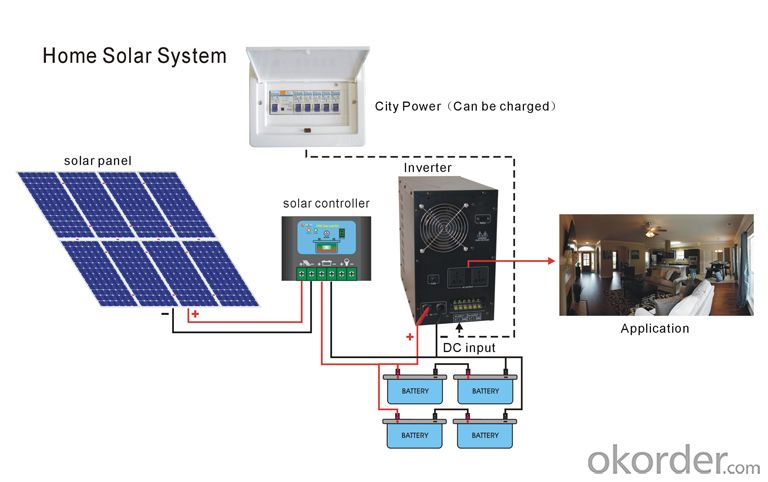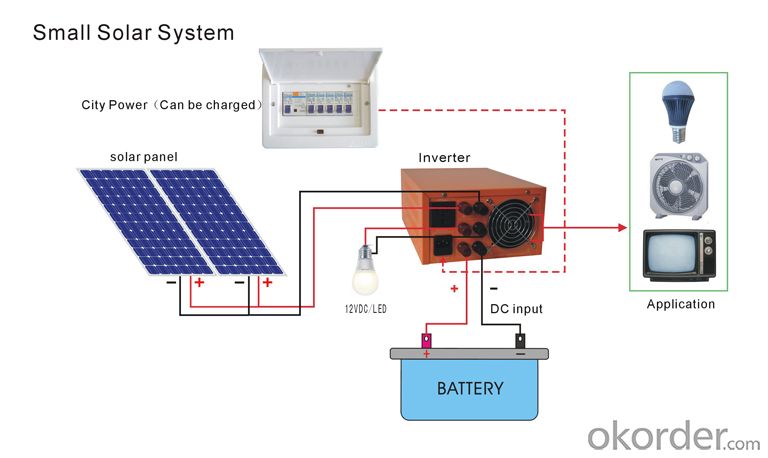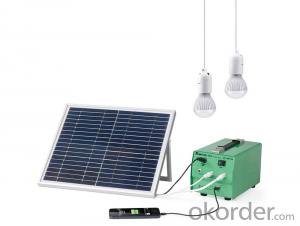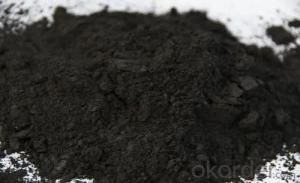5W Solar Lighting System Plug & Play Integrated Power Box
- Loading Port:
- Guangzhou
- Payment Terms:
- TT OR LC
- Min Order Qty:
- 50 set
- Supply Capability:
- 10000 set/month
OKorder Service Pledge
OKorder Financial Service
You Might Also Like

Features:
1. Solar panel : crystalline silicon 3W, efficiency>=16%;
2. Plug & Play Integrated Power Box: 1 pc (Built-in controller 3A/12V and maintenance-free lead-acid battery 4.5AH/12V),and within 1.5W led lamp ;
3. LED lamp sets: 1pcs. (1W/5V, 5m wires with on/off switch);
4. Charing cable : 1 x USB cable 10-in-1;
5. Charging time: An empty battery full charged about 6 hours under full sun. A full battery supports 2 LED lamps 8 hours;
6. Warranty: Panel 10 years; Battery 1 year; others 1 year.
| Item number | XT902-5W |
| Solar panel | Poly crystalline 5W |
| Battery | lead-acid battery 4.5AH/12V |
| LED lamp | 1.5watt, >50000 hours |
| cable of led lamp | 5 m |
| Weight | 3.5kg/set |
| Output | DC 12V and DC 5V |
| Working Time @ full battery | 2 LED lamps totally using 8hours. |
| Warranty | 1 years |

Quantuty
Quality goal:Constant innovation to meet the request of the customers. Protect the environment, provide environmental products to customer.
Quality strategy:
Quality: established high efficiency quality manager system in line with ISO9001 and ISO/TS16949.
Improvement: keeping improvement & quality guarantee.
Efficiency: delivery on time, complete the agreed events with the customers on time.
Service: focus on customers, provide the service and technology support on time.
FAQ
1. How long will my inquiry get response?
Your inquiry related to our products or prices will be replied within 24 hours.
2. Can I get professional service and suggestion?
Well-trained and experienced staffs to answer all your questions in fluent English.
3. Do you accept OEM or customized design?
OEM & ODM, any your customized lightings we can help you to design and put into product.
4. What if I need specific design?
Distributorship are offered for your unique design and some our current models.
- Q:Can solar energy systems be used in areas with frequent snowfall?
- Yes, solar energy systems can still be used in areas with frequent snowfall. While snow can temporarily reduce the efficiency of solar panels, it does not render them completely useless. Proper installation and maintenance, such as tilt adjustments or snow removal, can optimize their performance in snowy conditions. Additionally, advancements in technology, such as anti-reflective coatings and self-cleaning panels, are making solar energy systems more resilient to snow accumulation.
- Q:What is the maintenance schedule for a solar energy system?
- The maintenance schedule for a solar energy system typically involves regular inspections and cleanings to ensure optimal performance. Additionally, it is recommended to check the system's components, such as inverters, wiring, and batteries, for any signs of wear or malfunction. The frequency of maintenance depends on various factors, including the location, climate, and type of system. Generally, it is advised to have a professional inspection at least once a year, but regular self-monitoring and cleaning can help maintain the system's efficiency and longevity.
- Q:Can solar panels be installed on floating platforms or buoys in bodies of water?
- Yes, solar panels can be installed on floating platforms or buoys in bodies of water. Floating solar, also known as floating photovoltaic (FPV) systems, are becoming increasingly popular due to their numerous advantages such as increased energy production, reduced land usage, and minimized water evaporation. These platforms or buoys are designed to withstand water conditions and can be installed in lakes, reservoirs, and even offshore.
- Q:Do solar energy systems require batteries?
- No, solar energy systems do not necessarily require batteries.
- Q:How do solar energy systems impact the reliability of the electricity supply?
- Solar energy systems can enhance the reliability of the electricity supply by diversifying the sources of power generation. With solar panels generating electricity directly from sunlight, they provide an alternative and renewable source of energy that is not dependent on traditional fossil fuel power plants. This reduces the strain on the electrical grid and decreases the likelihood of blackouts or power outages. Additionally, solar energy systems can be integrated with batteries to store excess energy for use during periods of low sunlight or high demand, further enhancing the reliability and stability of the electricity supply.
- Q:Can solar energy systems be used for powering security cameras?
- Certainly, security cameras can indeed be powered by solar energy systems. The conversion of sunlight into electricity by solar panels enables the storage of energy in batteries or direct powering of different devices, such as security cameras. Consequently, solar energy emerges as an excellent and sustainable option for remote or off-grid areas where the installation of electrical cables might pose challenges or incur high expenses. Moreover, solar-powered security cameras possess the advantageous ability to function without interruption, provided there is an ample supply of sunlight to generate electricity. Consequently, they prove to be a dependable and environmentally friendly alternative for surveillance systems.
- Q:What is the role of charge controllers in solar energy systems?
- The role of charge controllers in solar energy systems is to regulate the amount of charge going into and out of the batteries. They ensure that the batteries are charged efficiently and prevent overcharging, which can damage the batteries. Charge controllers also protect the batteries from over-discharging, which can reduce their lifespan. Overall, charge controllers help optimize the performance and longevity of solar energy systems.
- Q:How efficient are solar energy systems?
- Solar energy systems are highly efficient as they convert sunlight directly into electricity or heat without any moving parts. With advancements in technology, solar panels have become more efficient, reaching conversion rates of up to 20-25%. However, overall efficiency can vary depending on factors such as location, weather conditions, and system design. Nonetheless, solar energy systems have proven to be a sustainable and reliable source of clean energy.
- Q:Are there any disadvantages of using solar energy?
- Yes, there are a few disadvantages of using solar energy. Firstly, solar panels and equipment can be expensive to install, which can be a barrier for some individuals or businesses. Additionally, solar power is intermittent and dependent on weather conditions, so it may not be as reliable or consistent as other energy sources. Furthermore, solar energy production requires a large amount of space, which may not be feasible in densely populated areas. Lastly, the manufacturing and disposal of solar panels can have negative environmental impacts if not properly managed. However, despite these drawbacks, the benefits of solar energy, such as reduced greenhouse gas emissions and long-term cost savings, often outweigh the disadvantages.
- Q:Can solar energy systems be used for greenhouse heating?
- Yes, solar energy systems can be used for greenhouse heating. By harnessing the power of the sun, solar panels can generate electricity or heat water that can be used to warm the greenhouse. This helps in maintaining optimal temperatures for plant growth and reducing reliance on conventional heating methods, making it an eco-friendly and cost-effective solution.
1. Manufacturer Overview |
|
|---|---|
| Location | |
| Year Established | |
| Annual Output Value | |
| Main Markets | |
| Company Certifications | |
2. Manufacturer Certificates |
|
|---|---|
| a) Certification Name | |
| Range | |
| Reference | |
| Validity Period | |
3. Manufacturer Capability |
|
|---|---|
| a)Trade Capacity | |
| Nearest Port | |
| Export Percentage | |
| No.of Employees in Trade Department | |
| Language Spoken: | |
| b)Factory Information | |
| Factory Size: | |
| No. of Production Lines | |
| Contract Manufacturing | |
| Product Price Range | |
Send your message to us
5W Solar Lighting System Plug & Play Integrated Power Box
- Loading Port:
- Guangzhou
- Payment Terms:
- TT OR LC
- Min Order Qty:
- 50 set
- Supply Capability:
- 10000 set/month
OKorder Service Pledge
OKorder Financial Service
Similar products
New products
Hot products
Related keywords






























